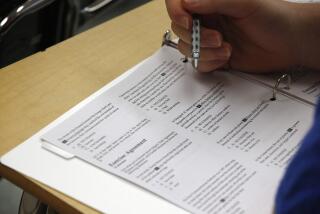Editorial: Despite complaints about bias, the University of California shouldn’t dump the SAT and ACT

According to a long-awaited University of California report, the SAT and ACT college entrance tests are far more than shiny medals for privileged teenagers whose parents can afford tutoring. Contrary to many assertions, their scores predict freshman success at UC campuses better than students’ grades do.
The university has been under heavy political pressure to drop the tests as an admission requirement, as some other colleges have done across the country. Board of Regents Chairman John A. Pérez, a powerful voice on the board, has been a vocal opponent of the tests. There’s even a lawsuit claiming that the use of SAT and ACT scores violates the state’s civil rights law.
Opponents of the tests point out that scores are closely correlated with families’ education and affluence and that people with money can pay for tutoring to improve their children’s scores. These render the tests inherently biased, they contend.
But throwing out the tests entirely would be a mistake. A faculty review team took a year to examine the role of the admissions tests from every angle. And though it concluded that UC needed to do more to create equity in the way it evaluates student applications, its preliminary recommendation is to keep the tests. The Board of Regents should heed its own experts and objective voices on this.
The scores already are not counted as heavily as grades for admission, even though they are better predictors of success. And they can act as an important check against high schools that inflate student grades, as the report noted. That actually helps disadvantaged students more than affluent ones because there is evidence that well-off schools are more likely to engage in grade inflation, the report said.
UC’s admissions aren’t as equitable as they need to be, the review found. But it said the use of test scores is not a major driver of that problem, in part because admissions officers already look at SAT and ACT scores in the context of students’ schools and backgrounds. The scores of a student who has had fewer educational opportunities are generally measured against the scores of similar students around the state.
That’s not to say the topic is settled and done. The report recommends eventually replacing the SAT/ACT with a more UC-specific assessment. That might cause its own problems. Would applicants then have to contend with yet another test among the many required on the path to college?
In addition, UC could look at other ways to put standardized test scores in context, by perhaps giving more weight in the admissions process to student experiences that show personal qualities of work ethic and resilience that would translate well to college.
But for now, UC should keep the test scores. Doing otherwise because of political or legal pressure or even personal beliefs would belie the very foundation of great universities, which pride themselves on open-minded inquiry and fact-based decision making.
More to Read
A cure for the common opinion
Get thought-provoking perspectives with our weekly newsletter.
You may occasionally receive promotional content from the Los Angeles Times.










